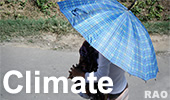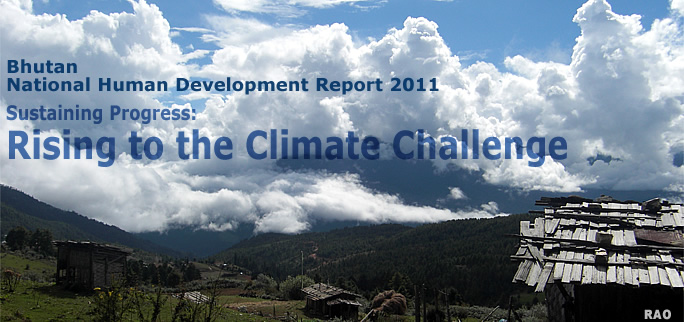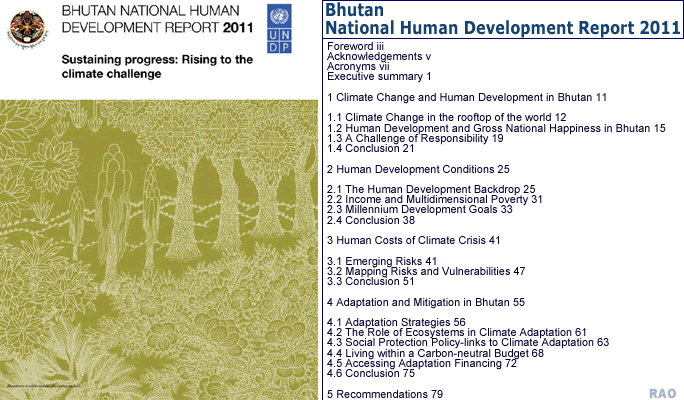 |
Bhutan Climate |
 |
Bhutan Information |
|
|
 |
|
Bhutan National Human Development Report 2011
|
|
Climate change threatens Bhutan’s Gross National Happiness
|

|
Impressive economic and human development gains that contribute to Bhutan's Gross National Happiness are threatened by changing climate conditions with the country's poorest people likely to suffer the worst impact, according to the third National Human Development Report released in Thimphu.
Building resilience is key to the livelihoods of the one quarter of Bhutan's population who live in poverty and depend on subsistence farming and local natural resources which are vulnerable to changing weather patterns and melting glaciers, says the report titled "Sustaining Progress: Rising to the Climate Challenge".
"Alternative development pathways, such as Gross National Happiness (GNH) that we are promulgating will influence the capacity of communities…to adapt to climate change," said Pema Gyamtsho, Minister of Agriculture and Forests, at the report's launch.
As part of its efforts to realize its wide-ranging GNH philosophy of life, Bhutan has prioritized conservation of the environment, including commitments to remain carbon neutral by keeping absorption of the greenhouse gas higher than emissions.
With imposition of an export ban on unprocessed forest timber and the country's forest cover at more than 70 percent, Bhutan has been able to keep its carbon absorption from agriculture, energy and industry sectors at levels allowing it to maintain its status as a net sink for greenhouse gases.
However, the hydropower sector, the biggest driver of Bhutan's economy, could come under threat from serious water shortages caused by the retreat of the country's glaciers, many melting at a rate higher than in other mountain ranges, according to the report.
"Resources are needed quickly given the long-term nature of adaptation initiatives and the short-term prospect of climate-related consequences," said Ajay Chhibber, UN Assistant Secretary General and United Nations Development Programme (UNDP) Assistant Administrator.
"The financing requirements for climate change adaptation and mitigation are considerable for a landlocked, least developed country such as Bhutan," headded.
The report recommends that Bhutan increase its resilience by integrating climate policies, strategies and action plans into national poverty reduction strategies and development plans. To balance economic growth, human development and environmental protection the report calls for 'green development' and for exercising further control of potentially harmful activities, such as logging, mining, mass tourism and the use of pesticides.
It also recommends improvements in other areas, including collection and analysis of research; establishing baseline climate information and data; expanding ongoing climate financing mechanisms; and improving management systems in climate-sensitive sectors such as agriculture, forests and water resources.
The report - a collaboration between the Gross National Happiness (GNH) Commission Secretariat on behalf of the Royal Government of Bhutan, and UNDP - is an outcome of consultations with various national institutions, civil society organizations and development partner agencies.
Also present at launch was Yeshey Zimba, Bhutan's Minister-in-Charge of Foreign Affairs and Minister of Works and Human Settlement.
 |
| Source: UNDP, 01. September 2011 |
 |
| Bhutan's Glacial Lakes and GLOF
|

|
top
|
Report
|
 |
top
|
Links
|
 |
 |
 |
External
links |
| Information on Bhutan |
 |
|






